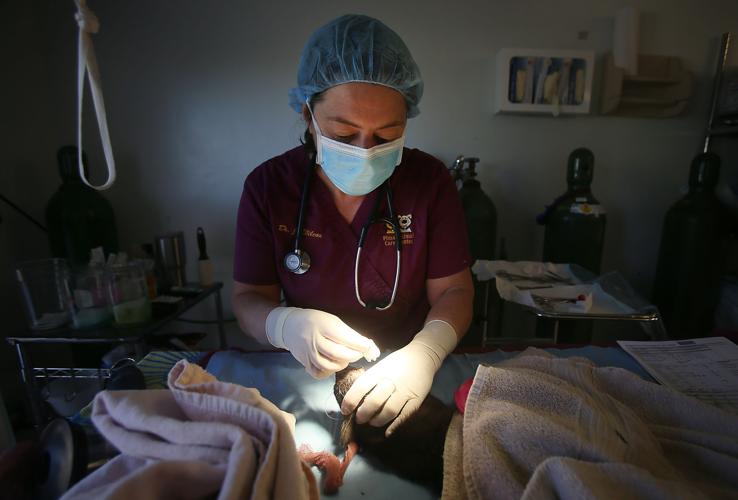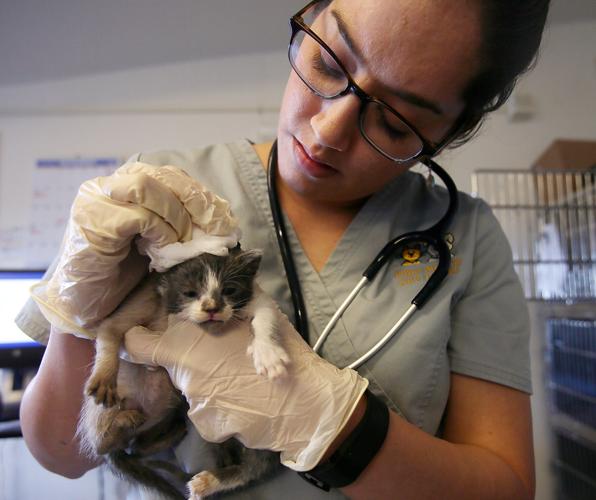A job listing for a veterinarian at the Pima Animal Care Center has received no applicants in nearly two months, leaving the two doctors on staff with crushing workloads.
About 95 percent of the animals at PACC are now being saved, which means there are even more surgical and medical needs to be met daily.
“Given the huge number of animals that pour into our shelter, PACC needs vet coverage for 10 to 12 hours each day in order to provide care for the sick and injured,” said Jennifer Wilcox, one of the veterinarians with the center.
“In addition, every dog and cat must be ‘fixed’ in order to be adopted, so PACC veterinarians perform surgery on hundreds of animals every week to keep them moving out of the shelter and into their forever homes,” she said.
As of Friday, there were 323 dogs and 298 cats at the shelter at 4000 N. Silverbell Road.
The prolonged job vacancy might be related to a broader local trend: An online search shows there are more than 20 veterinary vacancies in Pima County.
There are just under 1.5 advertised openings per job seeker nationwide for veterinary work, said Shane Burgess, dean of the University of Arizona’s College of Agriculture and Life Sciences.
“There has been a shortage of (doctors of veterinary medicine) in Arizona since before I came here more than five years ago — including during the recession when many were saying that there wasn’t,” he said.
The UA plans to begin a veterinary medicine program in the near future, although the starting date has not been established, said Bethany Rutledge, director of administration and communications for the College of Agriculture.
Burgess said the amount of debt students take on is hurting the field and potentially driving veterinarians to areas where they can earn more.
“In Arizona, I have met a number of graduates with greater than $300,000 debt,” he said, adding that the debt-to-income ratio is about 4-to-1.
Currently, Arizona residents interested in becoming veterinarians can do their undergraduate work here, but then have to choose between going to private school or paying out-of-state tuition.
“This means that DVM graduates, and especially Arizonans, have no choice but to seek out areas of the country where they can get paid enough to try to live and pay their debt off,” Burgess said.
But Michael Kaufman, veterinarian at Desert Hills Pet Clinic and president of the Southern Arizona Veterinary Medical Association, said he hasn’t heard there’s a shortage. Some people have said veterinary services are underutilized, he said.
“I know that there are positions open, but I don’t know if there’s a shortage,” he said.
PACC posted its job opening more than seven weeks ago, said José Ocaño, executive officer of operations at PACC. The pay range, which depends on experience, is about $85,000 to $95,000.
“We need someone who is fast but does high-quality work,” he said. Veterinarians at the animal center generally handle at least 30 spay-and-neuter surgeries per day, he said, as well as trauma surgeries, dental work and the treatment of sick animals.
For now, he said, they are trying to find someone to fill the position temporarily, at least.
“Our vets are extremely overwhelmed with the number of animals that we have,” he said. “We’re entering the time of year when the intake decreases, and so we’re hoping that will help.”
He said the two veterinarians there now are working hard to keep up.
“Their dedication is just incredible,” he said of Wilcox and her colleague, Sarah Rios. “I hope people know that despite these challenges, we are still striving to save animals.”





